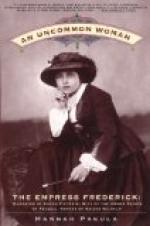“We shall bear your counsel in mind,” said the prince.
“We will not appoint him generalissimo!” exclaimed the princess. “He must never forget that he is our servant, and we his masters.”
“And now permit me to go, your highness,” said Ostermann. “Will you have the kindness, prince, to command your lackeys to bear me to my sedan-chair? It is impossible for me to walk a step. Yes, yes, while you are this night contending for a throne, I shall, perhaps, be struggling with death.”
And with a groan, sinking back into the arms of the lackeys whom the prince had called, Ostermann suffered himself to be carried down to his chair, which awaited him at the door. He groaned and cried out as they placed him in it, but as soon as its doors were closed and his serfs were trotting with him toward his own palace, the suffering expression vanished from Ostermann’s face, and a sly smile of satisfaction played upon his lips.
“I think I have well employed my time,” he muttered to himself. “The good Munnich will never become generalissimo, and poor old failing Ostermann may now, unsuspected, go quietly to bed and comfortably await the coming events. Such an illness, at the right time, is an insurance against all accidents and miscarriages. I learned that after the death of Peter II. Who knows what would then have become of me had I not been careful to remain sick in bed until Anna had mounted the throne? I will, therefore, again be sick, and in the morning we shall see! Should this conjuration succeed, very well; then, perhaps, old Ostermann will gradually recover sufficient health to take yet a few of the burdens of state upon his own shoulders, and thus relieve the good Munnich of a part of his cares!”
THE NIGHT OF THE CONSPIRACY
It was a splendid dinner, that which the regent had this day prepared for his guests. Count Munnich was very much devoted to the pleasures of the table, and, sitting near the regent, he gave himself wholly up to the cheerful humour which the excellent viands and delicate wines were calculated to stimulate. At times he entirely forgot his deep-laid plans for the coming night, and then again he would suddenly recollect them in the midst of his gayest conversation with his host, and while volunteering a toast in praise of the noble regent, and closing it by crying—“A long life and reign to the great regent, Biron von Courland!” he secretly and with a malicious pleasure thought: “This is thy last dinner, sir duke! A few hours, and those lips, now smiling with happiness, will be forever silenced by our blows!”
These thoughts made the field-marshal unusually gay and talkative, and the regent protested that Munnich had never been a more agreeable convive than precisely to-day. Therefore, when the other guests retired, he begged of Munnich to remain with him awhile; and the field-marshal, thinking it might possibly enable him to prevent any warning reaching the regent, consented to stay.




